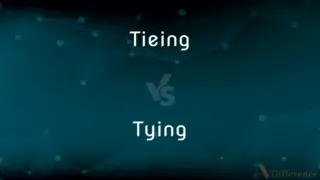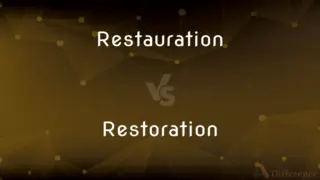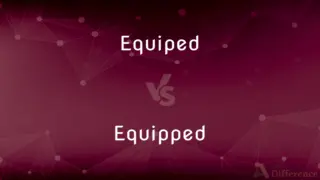Honney vs. Honey — Which is Correct Spelling?
Edited by Tayyaba Rehman — By Fiza Rafique — Updated on March 27, 2024
"Honney" is an incorrect spelling. The right spelling is "honey," a sweet substance made by bees.
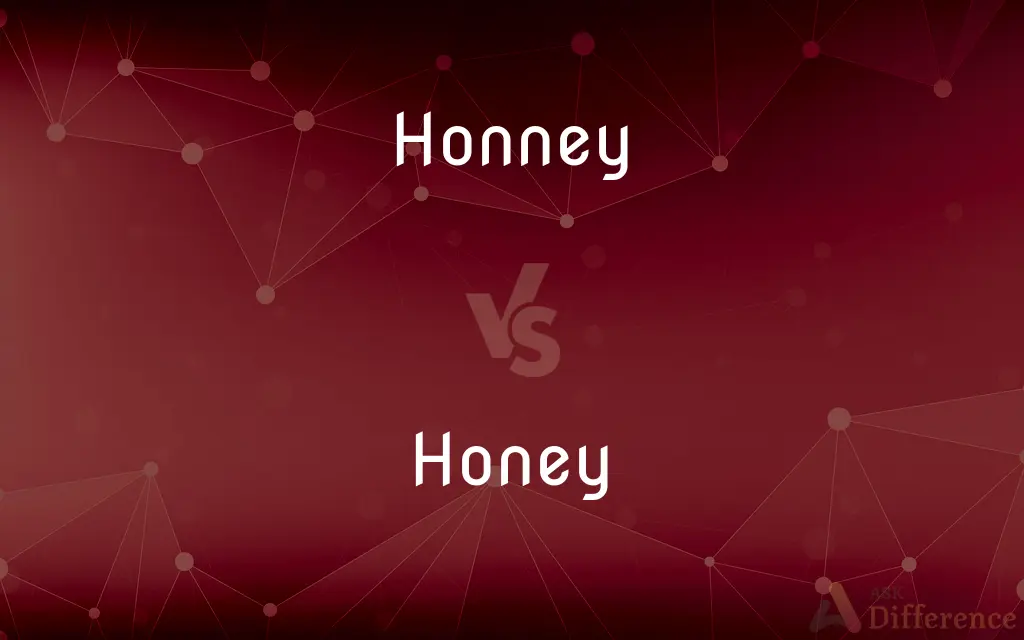
Table of Contents
Which is correct: Honney or Honey
How to spell Honey?

Honney
Incorrect Spelling

Honey
Correct Spelling
ADVERTISEMENT
Key Differences
Think of a bee having only one "n" in its name and spell "honey" with one "n."
Use pronunciation to guide you: "huh-nee" naturally leads to the spelling "honey."
Visualize a honey jar labeled "honey" to reinforce the correct spelling.
Honey is money without the 'm'—both have just one "n."
Relate "honey" to "one" – there's only one "n."
ADVERTISEMENT
How Do You Spell Honey Correctly?
Incorrect: We bought a jar of raw honney from the local market.
Correct: We bought a jar of raw honey from the local market.
Incorrect: She asked for honney in her tea because she didn't like sugar.
Correct: She asked for honey in her tea because she didn't like sugar.
Incorrect: They used honney as a natural remedy for coughs.
Correct: They used honey as a natural remedy for coughs.
Incorrect: The bear was looking for honney in the beehive.
Correct: The bear was looking for honey in the beehive.
Incorrect: Can you pass the honney? I'd like to add some to my yogurt.
Correct: Can you pass the honey? I'd like to add some to my yogurt.
Honey Definitions
A term of endearment.
I missed you, honey!
A sweet substance in other plants, like nectar.
The birds feed on plant honey.
A sweet yellowish or brownish viscid fluid produced by various bees from the nectar of flowers and used as food.
A similar substance made by certain other insects.
A sweet substance, such as nectar or syrup.
Sweetness; pleasantness
"The first few years could not have been all honey" (Nadine Gordimer).
(Informal) Sweetheart; dear. Used as a term of endearment.
(Informal) Something remarkably fine
A honey of a car.
To sweeten with honey; add honey to.
To make pleasant or appealing
His words were honeyed as he spoke.
To give a yellow or golden color to.
(uncountable) A viscous, sweet fluid produced from plant nectar by bees. Often used to sweeten tea or to spread on baked goods.
The honey in the pot should last for years.
(countable) A variety of this substance.
(rare) Nectar.
(figuratively) Something sweet or desirable.
A term of affection.
Honey, would you take out the trash?
Honey, I'm home.
A woman, especially an attractive one.
Man, there are some fine honeys here tonight!
A spectrum of pale yellow to brownish-yellow colour, like that of most types of (the sweet substance) honey.
Involving or resembling honey.
Of a pale yellow to brownish-yellow colour, like most types of honey.
(transitive) To sweeten; to make agreeable.
(transitive) To add honey to.
(intransitive) To be gentle, agreeable, or coaxing; to talk fondly; to use endearments.
(intransitive) To be or become obsequiously courteous or complimentary; to fawn.
A sweet viscid fluid, esp. that collected by bees from flowers of plants, and deposited in the cells of the honeycomb.
That which is sweet or pleasant, like honey.
The honey of his language.
Sweet one; - a term of endearment.
Honey, you shall be well desired in Cyprus.
To be gentle, agreeable, or coaxing; to talk fondly; to use endearments; also, to be or become obsequiously courteous or complimentary; to fawn.
Rough to common men,But honey at the whisper of a lord.
To make agreeable; to cover or sweeten with, or as with, honey.
Canst thou not honey me with fluent speech?
A sweet yellow liquid produced by bees
A beloved person; used as terms of endearment
Sweeten with honey
Having the color of honey
A sweet, sticky, yellowish substance made by bees.
She drizzled honey on her toast.
Something excellent of its kind.
That new song is pure honey.
A particular shade of the color yellow or brown.
She painted her room a warm honey hue.
Honey Meaning in a Sentence
She drizzled honey over her pancakes.
They harvested honey from their backyard beehive.
Bees produce honey from the nectar of flowers.
Honey can crystallize over time.
Adding honey to your tea can soothe a sore throat.
Ancient civilizations used honey for medicinal purposes.
Honey is a common ingredient in many desserts.
Honey has antiseptic properties.
Local honey is said to help with allergies.
Bears are known to raid beehives for honey.
Honey is sweeter than sugar.
Manuka honey is famous for its health benefits.
He likes his coffee with milk and honey.
Honey, can you help me with this?
Honeybees are essential for pollinating crops.
Honey can be used as a natural sweetener.
His grandmother always had honey in her tea.
The recipe calls for two tablespoons of honey.
She bought honey sticks for the kids.
Store honey at room temperature to keep it liquid.
They used honey to sweeten the fruit salad.
Honey and lemon is a popular remedy for coughs.
Honeycomb is edible and delicious with honey.
A spoonful of honey makes the medicine go down easier.
Wildflowers give honey a unique flavor.
Honey Idioms & Phrases
The land of milk and honey
A place of abundance and prosperity.
They moved to the city believing it to be the land of milk and honey.
Honey trap
A stratagem in which irresistible bait is used to lure a victim.
The spy used a honey trap to gather information from the diplomat.
Common Curiosities
What is the verb form of honey?
To honey (as in "to honey one's words") but it's rarely used.
What is the pronunciation of honey?
/ˈhʌn.i/
Which preposition is used with honey?
Depends on context, e.g., "with honey" or "in honey."
Which conjunction is used with honey?
Not specific to "honey"; depends on context.
What is the plural form of honey?
Honeys (when referring to different types or brands).
Is honey a noun or adjective?
Primarily a noun, but can also be an adjective (e.g., "honey color").
Is honey an abstract noun?
No.
Why is it called honey?
The term originates from Old English "hunig" and has been used to describe the sweet substance produced by bees.
What is the singular form of honey?
Honey.
Is honey an adverb?
No.
Is honey a negative or positive word?
Generally positive.
What is the root word of honey?
Derived from Old English "hunig."
Which vowel is used before honey?
Depends on context; there's no fixed vowel before "honey."
Is honey a countable noun?
No, but types of honey can be counted (e.g., two honeys).
Is honey a vowel or consonant?
"Honey" is a word, not a letter, so it contains both vowels and consonants.
How do we divide honey into syllables?
Hon-ey.
What is the opposite of honey?
There isn't a direct opposite, but in terms of taste, a counterpart could be "bitter."
What is the second form of honey?
Not applicable.
What is the third form of honey?
Not applicable.
Is the word honey imperative?
No.
What is a stressed syllable in honey?
The first syllable, "hon."
What part of speech is honey?
Noun, but can also be an adjective.
Which determiner is used with honey?
"Some," "a lot of," "much" are often used with honey.
What is the first form of honey?
Not applicable.
Which article is used with honey?
Both "a" and "the" can be used depending on the context.
How many syllables are in honey?
Two syllables.
Is honey a collective noun?
No.
Is the honey term a metaphor?
It can be, as in "sweet as honey."
What is another term for honey?
Nectar.
How is honey used in a sentence?
"She likes her tea with a spoonful of honey."
Share Your Discovery
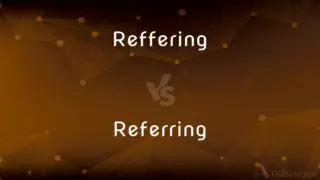
Previous Comparison
Reffering vs. Referring
Next Comparison
Casete vs. CassetteAuthor Spotlight
Written by
Fiza RafiqueFiza Rafique is a skilled content writer at AskDifference.com, where she meticulously refines and enhances written pieces. Drawing from her vast editorial expertise, Fiza ensures clarity, accuracy, and precision in every article. Passionate about language, she continually seeks to elevate the quality of content for readers worldwide.
Edited by
Tayyaba RehmanTayyaba Rehman is a distinguished writer, currently serving as a primary contributor to askdifference.com. As a researcher in semantics and etymology, Tayyaba's passion for the complexity of languages and their distinctions has found a perfect home on the platform. Tayyaba delves into the intricacies of language, distinguishing between commonly confused words and phrases, thereby providing clarity for readers worldwide.

